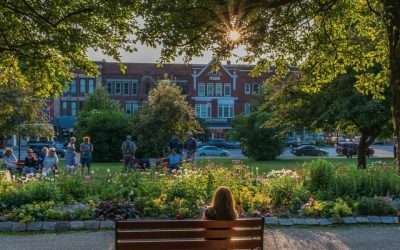Are you looking to buy a new home?
Before you sign on the dotted line, gathering as much information as possible about the neighborhood where the house is located is crucial. After all, the neighborhood you choose will significantly impact your daily life.
Don’t worry, though, because I’m here to help you navigate this process with five crucial questions to ask your realtor about the neighborhood.
First impressions can be deceiving, so it’s essential to dig deeper and ask the right questions to ask a realtor about the neighborhood. Your realtor is a valuable resource who can provide insights and information about the area.
By asking the necessary questions, you can gather the information to decide about your potential new home.
In this article, I will highlight five crucial questions you should ask your realtor before buying a home. These questions will help you assess the neighbourhood’s safety, amenities, and overall quality of life, ensuring you find the perfect place to call home. So, let’s dive in and ensure you make the best decision for your future.
1. What is the local crime rate?
Potential buyers should consult their real estate agent about the local crime rate when considering a new home, as safety is paramount.
A smart step is reviewing the most recent crime statistics, which your agent can help interpret. Up-to-date data can reveal trends and hotspots that may not be immediately obvious. Understanding petty and severe crime frequencies in the area and how local law enforcement responds to incidents is essential.
Knowing these factors is critical in determining a neighbourhood’s security, long-term property value, and peace of mind.
2. What are the local schools like?
In deciding where to plant family roots, one of the key questions concerns the caliber of local school districts.
Potential buyers must examine school programs closely, as they substantially impact children’s education and development. A reputable school district with a robust selection of academic and extracurricular programs can strongly indicate a neighborhood’s quality.
Evaluating factors like student-to-teacher ratios, standardized test scores, and the variety of available courses can offer valuable insight into the educational environment that children will experience daily.
3. How convenient are shopping and services?
For many homebuyers, the convenience of nearby shopping and services is a top priority.
Preferred locations often boast easy access to grocery stores, retail shops, healthcare facilities, and other essential services. When touring potential neighborhoods, it’s important to note the availability of ample parking space, which can significantly affect day-to-day convenience.
Accessibility to these amenities enhances everyday living and can also influence future property values. Before making a decision, consider the practicality of the area’s infrastructure to ensure it aligns with your lifestyle needs.
4. What is the noise level like in the neighborhood?
During the house hunting process, assessing the noise level in the neighborhood is a critical but often overlooked factor.
Potential noise pollution sources, such as traffic from main roads, nearby commercial activities, or local schools and playgrounds, should be evaluated. Prospective homeowners should consider visiting the area at different times of day to get a true sense of the ambient sound levels.
A quieter neighbourhood often means a more tranquil living environment, crucial for those seeking a peaceful retreat from the bustling outside world.

5. What is the traffic pattern during peak hours?
Asking insightful questions about the traffic pattern during peak hours is essential for understanding the ebb and flow of a neighborhood.
Congestion can significantly affect commute times, access to emergency services, and overall quality of life. It’s beneficial for prospective residents to observe the morning and evening rush hours firsthand. This observation can highlight potential bottlenecks, public transportation efficiency, and the availability of alternative routes.
Understanding these dynamics will help buyers anticipate daily commutes and gauge their tolerance for traffic-related stress in their potential new home.
6. How have property values in the neighborhood changed recently?
When investigating a neighborhood, consulting with a real estate professional to analyze the recent sales history offers crucial insights into property value trends.
Homebuyers should inquire about historical data, which can illuminate whether the neighborhood is on an upward trajectory or facing a potential decline in property values. An area with steadily increasing property values suggests a strong and potentially lucrative investment for the future. Conversely, stagnant or declining values may signal underlying issues or a saturation in the market.
This information is key for making an informed decision aligned with long-term financial goals.
7. Are there any future developments planned for the area?
For first-time home buyers, one of the essential questions to pose to a real estate agent relates to any future developments planned for the area.
Knowing what construction projects, community enhancements, or zoning changes are on the horizon is vital for setting realistic expectations about living in the neighborhood. Such developments can drastically alter the landscape, positively by adding value and amenities or negatively by increasing traffic or noise.
Staying informed through your agent can prevent surprises from affecting your satisfaction with the real estate deal and your future lifestyle in the new home.
8. What is the community vibe?
Delving into the community vibe is among the additional questions that shouldn’t be overlooked.
The ambiance of a neighbourhood goes beyond the physical space—it encompasses social interactions, the spirit of the local events, and overall neighbourliness. Potential buyers would benefit from exploring the area, perhaps visiting local cafes and parks and attending a community meeting if possible.
These interactions can offer a glimpse into the daily life and culture of the community. This intangible quality can make a house feel like home, and understanding the local vibe is essential.
Conclusion
In conclusion, hiring a realtor when selling your home is an intelligent move and can save you time, stress, and money in the long run.
From their expertise in pricing your home right to their negotiation skills, a realtor can make all the difference in selling your home quickly and at the best price possible.
So why go through the hassle of navigating the real estate market alone? Trust in a professional realtor who will have your best interests at heart and will work tirelessly to help you achieve your selling goals. Don’t miss out on the benefits of having a realtor by your side.
Contact one today and watch your selling journey become smoother and more successful than ever.


